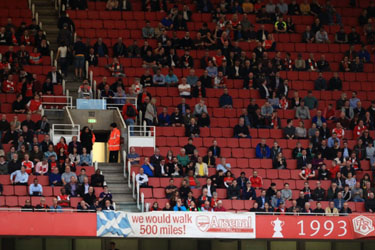Football has long been called the people's game, mainly because of its immense popularity globally and its original roots in working class, mainly male culture. This would not be the case for, say, cricket, rugby union or rowing. In countless countries in all continents on the planet, the followers of this sport are fanatical. Yet it is in England, where the sport was invented, that the numbers of those paying to watch live games blow all other countries out of the water, to the extent that the English second tier attracts more fans than all other European leagues apart from Germany's Bundesliga.
And yet those watching Arsenal's match against Watford on TV last week will perhaps have been surprised by the multitude of empty seats on view. How can the official attendance state that upwards of 59,000 fans turned up when the physical evidence is so blatantly contradictory? One TV pundit, reflecting on Arsenal's recent woes and the inevitable question of the future of manager Arsene Wenger mused that "all those empty seats might have an effect on the owner".
In the words of Delboy Trotter, "au contraire, Rodders". Why should owner Stan Kroenke worry about empty seats which have already been paid for? Some long-standing Gunners fans may have swelled the ranks of absentees but in my circle of friends those who have been season-ticket holders for years do tend to go to all matches, and if they don't they try to pass tickets on to friends. This is often not the case for relative newcomers and certainly not for the thousands of season tickets owned corporately, in the broadest sense. However the sad truth is that the working-class fans who have been priced out of the stadium would be 10 times more likely to fill those empty seats than those with disposable cash who have taken their places in the ground, or, increasingly, not in the ground.
And then there's West Ham. On the same weekend, a few miles from Holloway, there were pretty shabby scenes flashed around the world of what appeared to be Hammers fans invading the pitch and even involved in scuffles with their own players. There are many reasons for the fans' malaise but the uniquely cack-handed and possibly corrupt way (allegedly) the stadium came to house a team whose quaint former home engendered a fearsome atmosphere and lashings of nostalgia is at the heart of the problem. A despised board, a pitch miles away from the punters and a soulless, vacuous stadium all play their part too.
Yet in both instances the "people" who once proudly owned their game have been at the centre of attention, in East London by totally failing to manage a drinking session in a brewery, and in North London by staying at home.
Now here's the thing. Manchester United have the highest number of season ticket holders in England, at 55,000. Not surprisingly, Arsenal, with 45,000, are third. Guess who weigh in second with 50,000? No, not Man City. Not Liverpool. Not Chelsea. It's West Ham. Now whatever you say about their board, they have tried hard to offer innovative deals for pensioners, kids and families. And their income from season ticket sales is thus far less than Kroenke gets at the Emirates. But despite its continuing location as a club in London's east end, West Ham FC has long drawn its core support, not from Shoreditch, Stratford and Hoxton, but from Benfleet, Southend and Grays in Essex. And whereas AFC pulled in their weekly customers from the Caledonian Road, Finsbury Park and Hoxton when it was a really tough neighbourhood, they now come from all points and areas, from Hemel Hempstead to Tunbridge Wells and from Esher to Bergen.
The spectre of hooliganism, if not completely defunct, has greatly diminished in the Premier League, the obscene cash cow that never shies away from calling itself the best league in the world. Yet greedy agents and players are trying the patience of long-suffering fans. Greedy owners are too often out of touch with supporters. And greedy TV giants completely take fans for granted with cynical scheduling continually punishing away fans for their loyalty. A European super league awaits for sure. It's only a matter of time. World Cups have been handed to Russia and Qatar for God's sake. What was the point of getting rid of Blatter? Still being a manager isn't that bad. Once you're on that merry-go-round, baby, you earn loads of dosh, the sooner the sacking into your lucrative deal the better.
Harsh? On a nondescript weekend in March 2018 in London two matches took place which will be forgotten in no time. Or could it just be the first sign that the rampant runaway train of private TV-fuelled and uncontrolled inflation with total disregard for the paying customers is just showing a crack or two? You may say I'm a dreamer and I am almost certainly barking up the wrong money tree. But, hey, wouldn't it be nice if in 5, 10 or 15 years time when the people regain control of their game someone would say; "You know what, it all started in March 2018"? Nah, no chance. I'm off to look up nerve agents on the internet.








